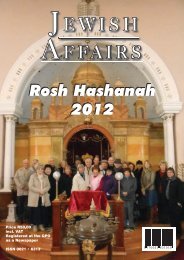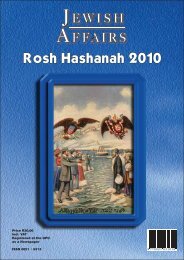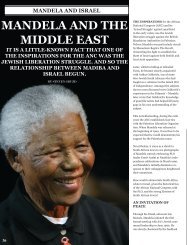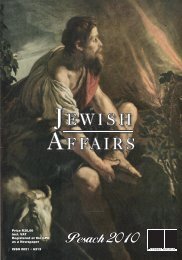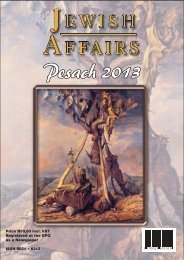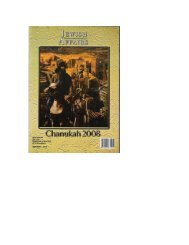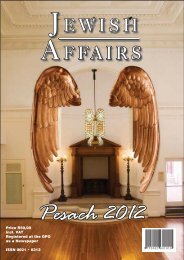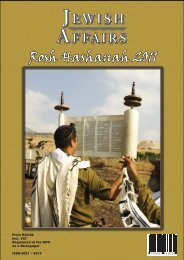Rosh Hashanah 2009 - South African Jewish Board of Deputies
Rosh Hashanah 2009 - South African Jewish Board of Deputies
Rosh Hashanah 2009 - South African Jewish Board of Deputies
- No tags were found...
Create successful ePaper yourself
Turn your PDF publications into a flip-book with our unique Google optimized e-Paper software.
JEWISH AFFAIRS ROSH HASHANAH <strong>2009</strong>A LAMENT ON THE DEATH OFYEHUDAH LEIB SCHRIRE*Naomi Dison KaplanIn the course <strong>of</strong> my research for my thesis onHebrew laments, I came across a poem, Al MotYehudah Leib Schrire - “Upon the Death <strong>of</strong> YehudaLeib Schrire” - by Benjamin Turtledove, written forhis late friend and teacher. I selected this poembecause I wanted to make it known that laments werebeing written in Hebrew in Cape Town, and tocounter criticism that academic work in <strong>South</strong> Africawas Eurocentric and not related to life in Africa.This lament was written in 1912 by Turtledove(whom, we can guess, had previously had a different,‘Yiddishe’, name), following the death <strong>of</strong> his friendYehudah Leib Schrire. His lament, in Hebrew, wasincluded in Nehemia Dov H<strong>of</strong>fmann’s Book <strong>of</strong>Memoirs (1916), the first Yiddish book ever publishedin <strong>South</strong> Africa. In 1996, this was translated from theYiddish into English by Lillian Dubb and into Hebrewby Sheila Barkusky, and published through the KaplanCentre for <strong>Jewish</strong> Studies and Research, University<strong>of</strong> Cape Town, making it available to a new generation<strong>of</strong> readers.Schrire was born into a scholarly family in Vilnaand died in Cape Town at the age <strong>of</strong> 61. He was a poetand writer in Hebrew and Yiddish, and wrote variousarticles for the <strong>Jewish</strong> press. He left many Hebrewbooks, poems and other writings and also devotedhimself to promoting secular and Hebrew scholarship.Benjamin Turtledove himself was born inMedzerich, Poland, in 1872, and studied at Yeshivotin Volozhin, Pressburg and Vienna. In Vienna, healso attended university as an “ExtraordinaryScholar”. He studied French in Paris, lived for awhile in Manchester and then came to Cape Town asprincipal <strong>of</strong> the Talmud Torah. He, too, was a Yiddishand Hebrew journalist, publishing under thepseudonym Ish Ploni (“Mr X”), and was recognisedas an excellent poet (H<strong>of</strong>fmann, 1996:45).Turtledove’s lament addresses ‘listeners’, as ifthey are standing at a funeral, mentioned as thegrieving family, friends, co-workers in theinstitutions, scholars, young and old. The Hebrew iseloquently formal and constrained. The poet is sparingin metaphors and poetic devices. The poem includesreferences to traditional sources, and uses wordsinfluenced by the Aramaic <strong>of</strong> the Talmud.In each verse, either the verse itself or one <strong>of</strong> itsDr Naomi Dison Kaplan, was educated at theUniversities <strong>of</strong> the Witwatersrand and Cape Townand the Rabbi J L Zlotnick Hebrew Seminary. Shewas awarded her Ph.D. for her thesis, “The Power<strong>of</strong> Laments in Alleviating Despair: Revisiting HebrewLaments” (U.C.T., 2003).lines starts with the word Ayei or Ayeihu, which isvery much like a refrain from Eichah (Book <strong>of</strong>Lamentations). The mainstay <strong>of</strong> the poem are theconstant rhetorical questions “where is he?” and“why did he die so young?” - Madu’a maheir azavcheled? (“Why did he hasten to leave this world/lifetime/duration <strong>of</strong> life”) and Halo yipaked m’komo 1bveiti, bein rei’a’v v’mosdim rabim (“Will he not bemissed in my house, [also] among his many friendsand many institutions?” 2 The poet goes on to say:“The work is much and there are no workers”. 3 Hereemphasises that Schrire died so young: Ha-omnammeit vayispe b’lo yomo … In Genesis 18:23, the wordtispe is used, Ha’af tispe tzaddik im rasha (“Will yousweep away the righteous, the tzaddik with thewicked?”) We are told in the poem that the greatlymissed Schrire was a righteous man, and the impliedreference seems to question again why the righteoushad to die as though wicked.V’et beito v’et rei’av azav la’atzavim – “He lefthis house and his friends to sorrow and pain”: Theword atzavim used here has many meanings andcould also mean “melancholy” or “toil”. In modernHebrew, etzev would probably be used.Schrire, ayeihu ha’askan v’hasafra? - “Schrire,where is he? The one who knows about books?”:Safra is an Aramaic word used in the expressionsafra v’sayafa, that is, a “knower <strong>of</strong> books and aswordsman”. This could be an intimation that he wasa fighter for what he believed in - not only was he a“knower <strong>of</strong> books”, but also an askan (“communalworker”). 4 He was also a “basket full <strong>of</strong> Torah,chochma v’da’at”.The poet continues: “Will not every one, thehoary head, the young and the child wait for hisadvice; he was like an eye to them”. Barkuskytranslates the last verse as: “Where is he? Listen andI will tell you!” although the original poem reads inarchaic Hebrew Ma’du’a? a’yei’hu? Sh’maa’shi’v’kha a’ma’rim - “Why? Where is he? Hearand I will answer your words”. The English versioncontinues, “He was a truly noble soul” 5 and then with“The vanities <strong>of</strong> this earth being too much for him/Heascended to a higher plane.” This latter quotation isa translation <strong>of</strong> Va’y’hi ki ozen v’cheiker ha’b’liiha’yitzurim vayikatz bam – va’ya’al hashamayim.(In using this unusual Hebrew, Turtledove tells thereader that Schrire hated idle conversation andgossip.) Herein there could be a hint that he is leavingthis plane and joining the angels, which is moresuitable for him.The speaker begins the exordium by arousing theempathy <strong>of</strong> the listeners and speaks <strong>of</strong> the relationship28



